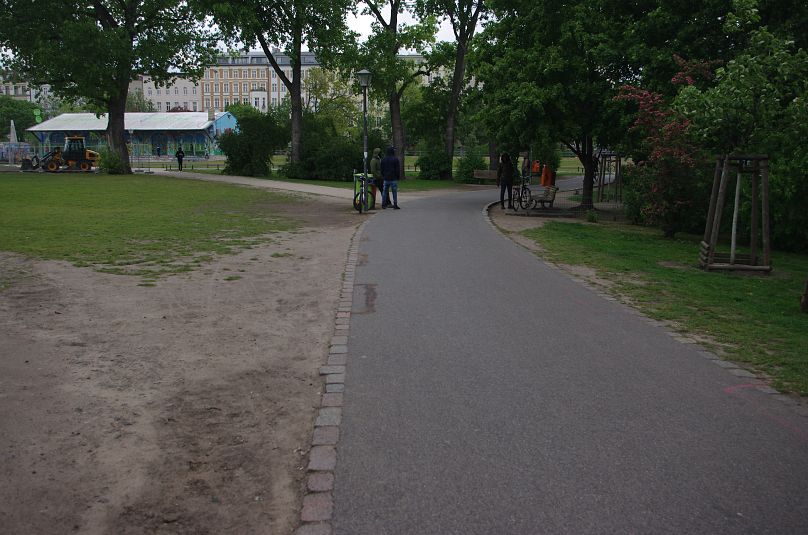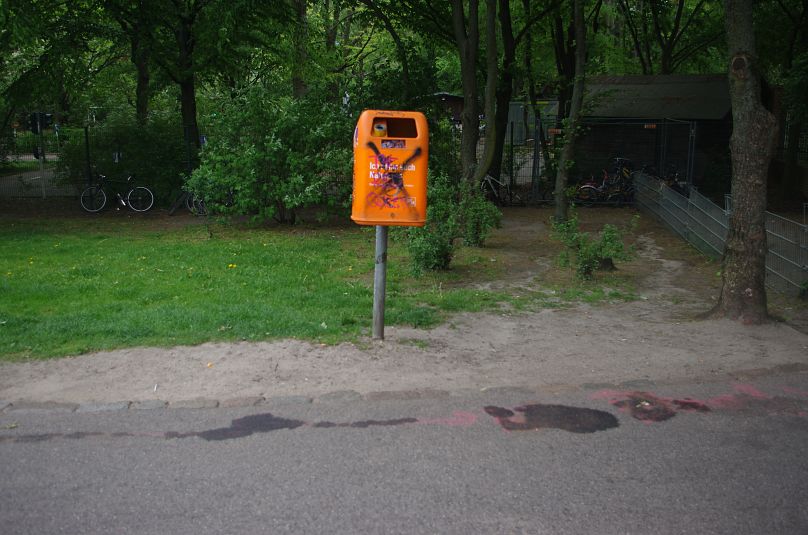"I thought it was a piece of art. But as a direct attempt to solve the issue of drugs this is, of course, ridiculous."
The new manager of a Berlin park has come under fire after trying to solve its drugs problem by creating special zones for dealers.
On Wednesday pink rectangles, like the one above, were drawn at Görlitzer Park in a bid to keep sellers away from joggers and families.
But the move by park manager Cengiz Demirci has sparked controversy in the German capital, with the public and politicians criticising the idea.
"Instead of fighting drug crime, drug trafficking is now organised," tweeted Berlin CDU politician Burkard Dregger.
Demirci told Berlin media this was not a move geared towards the legalisation of drugs sales.
"We just want people not to be disturbed when in the park, and not being constantly asked if they want to buy drugs," he said.
For several years the park has been in the news for its drug problem. The city has been debating how to solve the problem, but no solution has yet been found.
After the pink paint emerged at the park this week, the district office of Friedrichshain-Kreuzberg distanced itself immediately.
"Making these markings was an improper proposal for improvement," spokeswoman Sarah Lühmann told Euronews.
She said the designated zones were obsolete and that the city had no intention to legitimise drug sales.
"In addition, the fight against drug crime is primarily a responsibility of the police," she added.
Is this a joke?
At first, many Berliners thought the pink lines were a joke or some kind of art installation.
"I thought it was a piece of art. A bit like Schlingensief's work. But as a direct attempt to solve the issue of drugs this is, of course, ridiculous." says Christoph Hager.
The 45-year-old, who often visits the park with his daughter, said that he hasn't had a single negative experience. His girlfriend though complains that drug salesmen have repeatedly offered her drugs despite her refusals.
Hager is also interested in highlighting the perspective of the sellers in the debate.
"Probably the situation is generally difficult for people who come to Berlin. It would be sad if a two-tier society emerged, in which migrants would have to lead a life in the underworld," he said.
Other parents echoed Hager.
Isabel Feifel often takes her children, aged four and seven, to "Görli", the name Berliners have given the park.
Feifel said the problem was a reflection of the failure to integrate people.
"Many people take to selling drugs because of their precarious living situation, and lack of legal work permit," she said.
'None of us want to sell drugs'
Until two and a half years ago, a man who prefers to remain anonymous, sold drugs in the park because he did not have a work permit.
Like many migrants who come to Germany from African countries, he said, he got only tolerance at best in the country, but no work permit.
"None of us wants to sell drugs willingly," he said.
It was only after his marriage to his partner that he could start working legally.
Today he works at the reception of a hotel. He believes that park manager Demirci sprayed the surfaces with paint only for media attention.
Zero tolerance policy 'unsuccessful'
Up until around 2016, there was a zero tolerance policy towards the drug dealers, but it did not stop the problem.
Police used to go after drug sellers and even confiscate individual joints. Many residents thought the presence of the police was more reprehensible than the sellers'.
"Police chasing people in the park is worse than people selling drugs," Lucie Bauer, a frequent visitor, told Euronews.
During this period of controversy, the district office has taken the opportunity to promote their efforts to improve the park. Since 2016, the office has endeavoured to make the park more pleasant for all users.
For example, new toilets have been installed.
In addition, the district office has set up a park council comprising the park manager, local residents and users of the park.
In a press release, the district office also pointed out that the colour used to draw rectangles is water-soluble.













